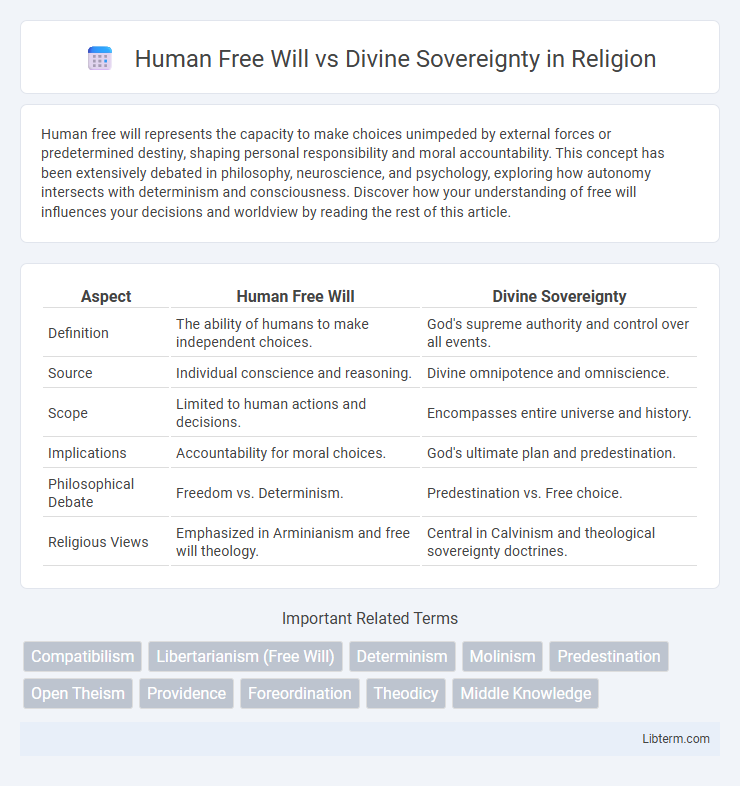Human free will represents the capacity to make choices unimpeded by external forces or predetermined destiny, shaping personal responsibility and moral accountability. This concept has been extensively debated in philosophy, neuroscience, and psychology, exploring how autonomy intersects with determinism and consciousness. Discover how your understanding of free will influences your decisions and worldview by reading the rest of this article.
Table of Comparison
| Aspect | Human Free Will | Divine Sovereignty |
|---|---|---|
| Definition | The ability of humans to make independent choices. | God's supreme authority and control over all events. |
| Source | Individual conscience and reasoning. | Divine omnipotence and omniscience. |
| Scope | Limited to human actions and decisions. | Encompasses entire universe and history. |
| Implications | Accountability for moral choices. | God's ultimate plan and predestination. |
| Philosophical Debate | Freedom vs. Determinism. | Predestination vs. Free choice. |
| Religious Views | Emphasized in Arminianism and free will theology. | Central in Calvinism and theological sovereignty doctrines. |
Introduction: Defining Free Will and Divine Sovereignty
Human free will refers to the capacity of individuals to make choices independent of external coercion or predetermined fate. Divine sovereignty denotes the supreme authority and control of a divine being over all creation, governing events according to a divine plan. Understanding the interplay between these concepts involves exploring how human autonomy coexists with the overarching power of divine governance.
Historical Perspectives on Human Choice and Divine Control
Historical perspectives on human free will versus divine sovereignty reveal a complex interplay between individual choice and divine control, with early Christian theologians like Augustine emphasizing God's omnipotence while affirming human responsibility. Medieval scholastics such as Thomas Aquinas attempted to reconcile free will with divine foreknowledge by positing that God's timeless knowledge does not compromise human freedom. The Reformation intensified debates as Calvinists underscored predestination and divine election, contrasting with Arminian advocates who defended conditional election based on human response.
Philosophical Foundations: Free Will in Human Experience
Human free will, grounded in existentialism and libertarianism, posits individuals as autonomous agents capable of making meaningful choices independent of deterministic forces. Philosophers like Sartre emphasize subjective consciousness and intentionality as core to human freedom, while compatibilists argue that free will can coexist with divine sovereignty through the alignment of human desires with predetermined divine will. The philosophical foundation of free will in human experience challenges deterministic and theological claims by asserting moral responsibility and personal agency as essential to ethical life.
Scriptural Interpretations of Sovereignty and Freedom
Scriptural interpretations of divine sovereignty emphasize God's supreme authority and control over all creation, as seen in passages like Isaiah 46:9-10 and Romans 8:28, affirming that God's will ultimately governs earthly events. Conversely, scriptural references to human free will, such as Deuteronomy 30:19 and Joshua 24:15, highlight the responsibility and capacity given to individuals to choose obedience or disobedience, reflecting moral accountability. The theological tension arises in reconciling verses on divine predestination with exhortations to human decision-making, underscoring a complex interaction between God's preemptive sovereignty and genuine human freedom within biblical texts.
Major Theological Views on Divine Sovereignty
Major theological views on divine sovereignty include Calvinism, which emphasizes God's absolute control over all events and predestination, asserting that human free will operates within God's sovereign plan. Arminianism counters with conditional election and prevenient grace, maintaining that divine sovereignty coexists with genuine human free will to accept or resist salvation. Open Theism proposes that God's knowledge of future free actions is dynamic, allowing human decisions to shape certain future outcomes within God's sovereign purposes.
The Paradox: Can Free Will and Sovereignty Coexist?
The paradox of human free will versus divine sovereignty centers on whether individuals can genuinely exercise free choice if God's supreme authority governs all events. Theologians debate compatibilism, which argues free will operates within divine predestination, against incompatibilism, suggesting true freedom contradicts absolute sovereignty. Biblical passages such as Romans 8:28 and Deuteronomy 30:19 illustrate this tension by emphasizing both God's control over outcomes and human responsibility in decision-making.
Implications for Morality and Responsibility
Human free will and divine sovereignty intersect significantly in shaping concepts of morality and responsibility, where the belief in free will upholds individuals as accountable agents for ethical choices. Divine sovereignty suggests a supreme authority guiding events, prompting debates on whether moral responsibility is diminished if divine predestination governs actions. This tension influences theological and philosophical frameworks, affecting interpretations of justice, punishment, and moral accountability in human behavior.
Free Will, Providence, and Predestination Debates
Human free will centers on the belief that individuals exercise genuine choice in moral and spiritual decisions, an idea deeply intertwined with free agency and personal responsibility. Providence, often understood as divine guidance or intervention in worldly affairs, raises questions about the balance between God's control and human autonomy. Predestination debates examine whether divine sovereignty preordains every event, challenging the extent of free will and sparking theological discourse on salvation, foreknowledge, and human freedom.
Practical Effects on Faith and Daily Living
Human free will allows individuals to make personal choices that shape their faith journey and moral decisions, fostering a sense of responsibility and active participation in spiritual growth. Divine sovereignty emphasizes God's ultimate control and providence, offering believers comfort and assurance that their lives unfold according to a purposeful divine plan. Balancing free will and divine sovereignty affects daily living by encouraging trust in God's guidance while maintaining accountability for ethical actions and spiritual disciplines.
Conclusion: Harmonizing Human Freedom with Divine Rule
Human free will operates within the parameters of divine sovereignty, allowing individuals to make authentic choices without negating God's ultimate authority. Theologians emphasize that divine providence and human responsibility coexist, where God's omniscience does not compromise human agency. This harmonization affirms that human freedom is meaningful and purposeful under the guidance of divine rule.
Human Free Will Infographic

 libterm.com
libterm.com